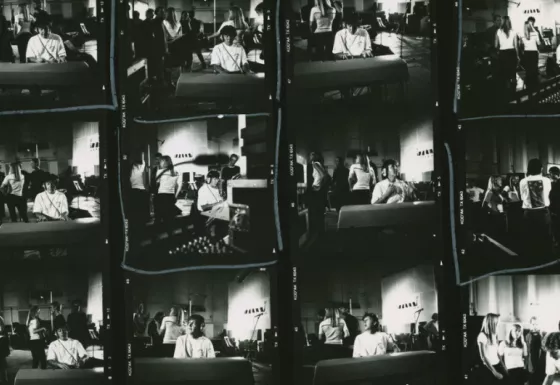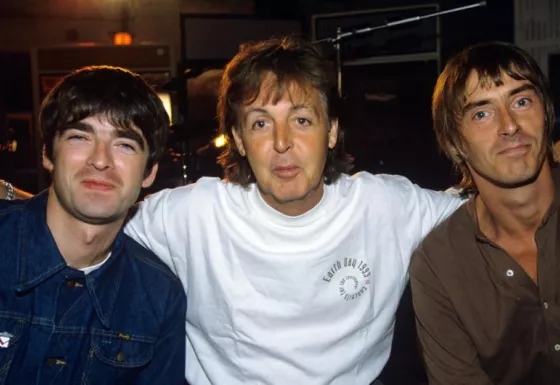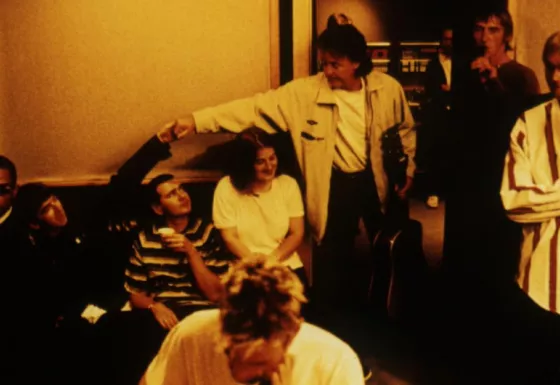
To mark its 25th anniversary, we've relaunched HELP on limited edition vinyl and streaming services. Get your hands on a copy today.
Featuring some of the biggest names in British music, the iconic album was bound to make history. But here's seven fascinating things you might not know about how the extraordinary album came together.
The album was initially going to be a one-off gig.
When a group of music industry legends decided they wanted to help the children of war-torn Bosnia, they put their brains and contacts together in the best way they knew how.
"The initial idea was a big gig with The Stone Roses and Black Grape" said Roses' PR Terri Hall. "But the venue, Old Trafford Cricket Ground, fell through." And in hindsight, we're so glad it did!
The entire album was recorded in just 24 hours.
This idea came from John Lennon, who, when discussing his 1970 record "Instant Karma" said that records should be like newspapers, reflecting events as they are happening. "The best record you can make" the Beatle claimed "is recorded on Monday, cut on Tuesday, pressed up on Wednesday, packaged on Thursday, distributed on Friday, in the shops on Saturday..."
As ideas go it fitted the brief rather nicely. So, HELP would be recorded on a Monday, mastered on a Tuesday, pressed on a Wednesday... you get the idea.

And Noel Gallagher worked flat-out for the whole time
Special mention must go to Noel Gallagher who worked solidly for almost the entire 24 hours - recording two tracks, conducting interviews, attending photo sessions and even dropping off Oasis' new version of 'Fade Away' at Radio One.
The Stereo MCs and Manic Street Preachers almost missed the 24 hour cut-off
The two groups both cut it extremely fine by arriving at their respective studios mere hours before the midnight deadline.

The KLF went above and beyond to promote the album
The group, operating under the name One World Orchestra, finished their track 'The Magnificent' at 10am, talked the Yugoslavian embassy into issuing them visas by 10.30am and promptly boarded a plane to Sarajevo to, among other things, debut the track on the underground B92 radio station in the very city it would be helping.
There were a series of "technical hitches" which threatened the album's creation
International Marketing Manager and album mastermind Tony Crean crashed his car while trying to tune the radio, the tapes of the Manic Street Preachers' song missed the last ferry from France and Neneh Cherry's caught the last cargo plane out of Malaga in the nick of time.
The mastering managed to overrun, but by 9pm the tapes were winging their way to pressing plants in Blackburn, Telford, France, Germany and Holland to be turned into CDs and cassettes. Helicopters were cancelled due to bad weather, bikes were dispatched with police escorts and a private jet took a whirlwind trip around Europe's pressing plants.
Both Q Awards and the BRITS created new awards to recognise HELP
At the Q Awards in November 1995, Tony Blaire presented a specially-created award for the record. "This is a remarkable album" he said. "At a time when there was a danger of the West turning its back on the war in Bosnia, it helped put it back in the headlines and reactivate public interest. It helped us be aware of our responsibilities to other people".
Find out more about the album's history by listening to Help - the Story of the War Child Album, a podcasted narrated by Matt Everitt with help from some of those involved in making the record happen.
And all of this is just a snippet of the hard work and dedication that went into making HELP a huge success. Back in 1995 the album raised an incredible £1.25 million for War Child. A staggering amount, which made a huge difference to the lives of children living through the conflict in Bosnia.
Today, children living in conflict zones and refugee camps around the world are facing the devastating impacts of Coronavirus. By buying or downloading a copy of HELP today, you'll be helping War Child be there for some of the most vulnerable children and their families.

